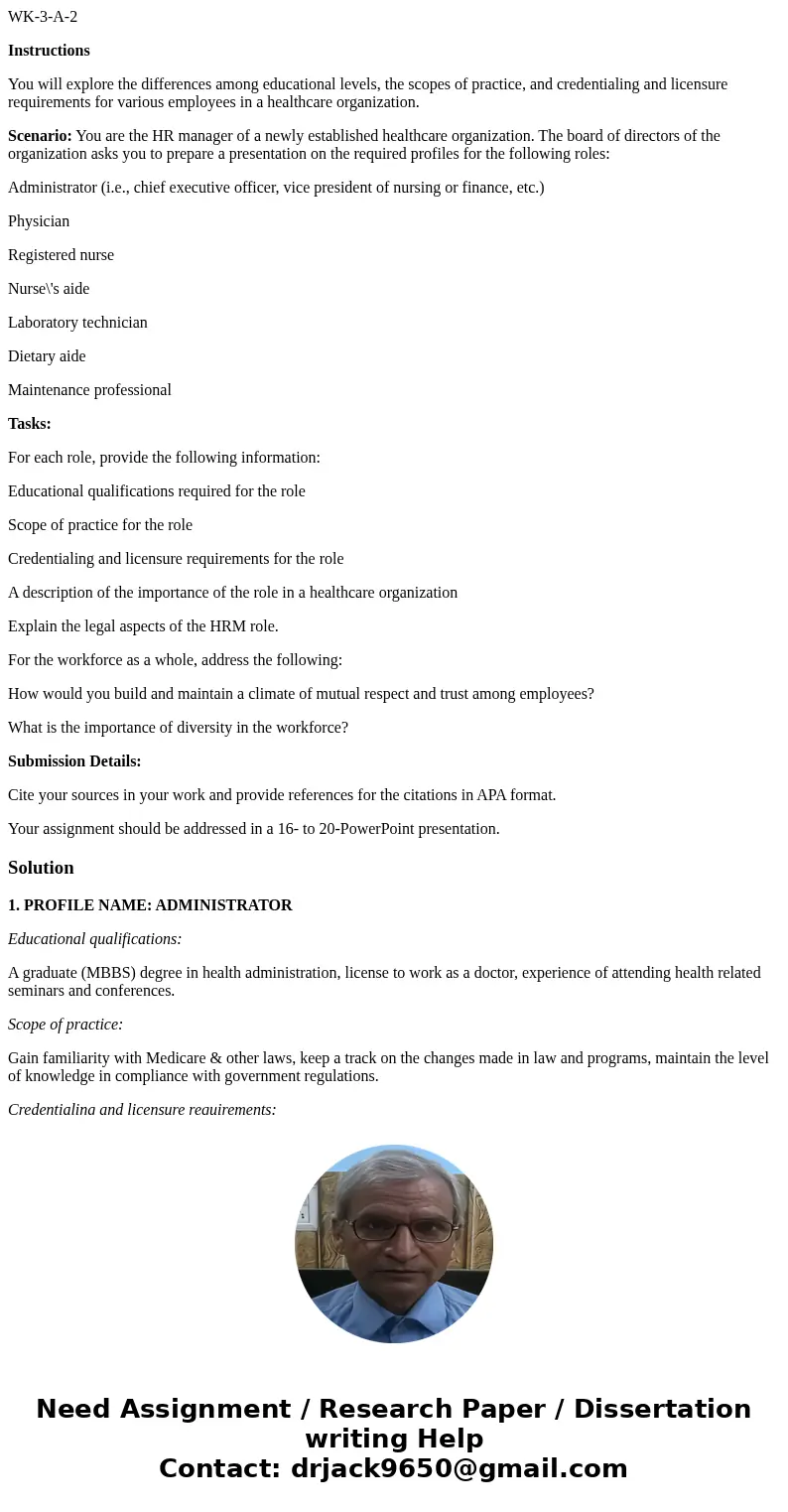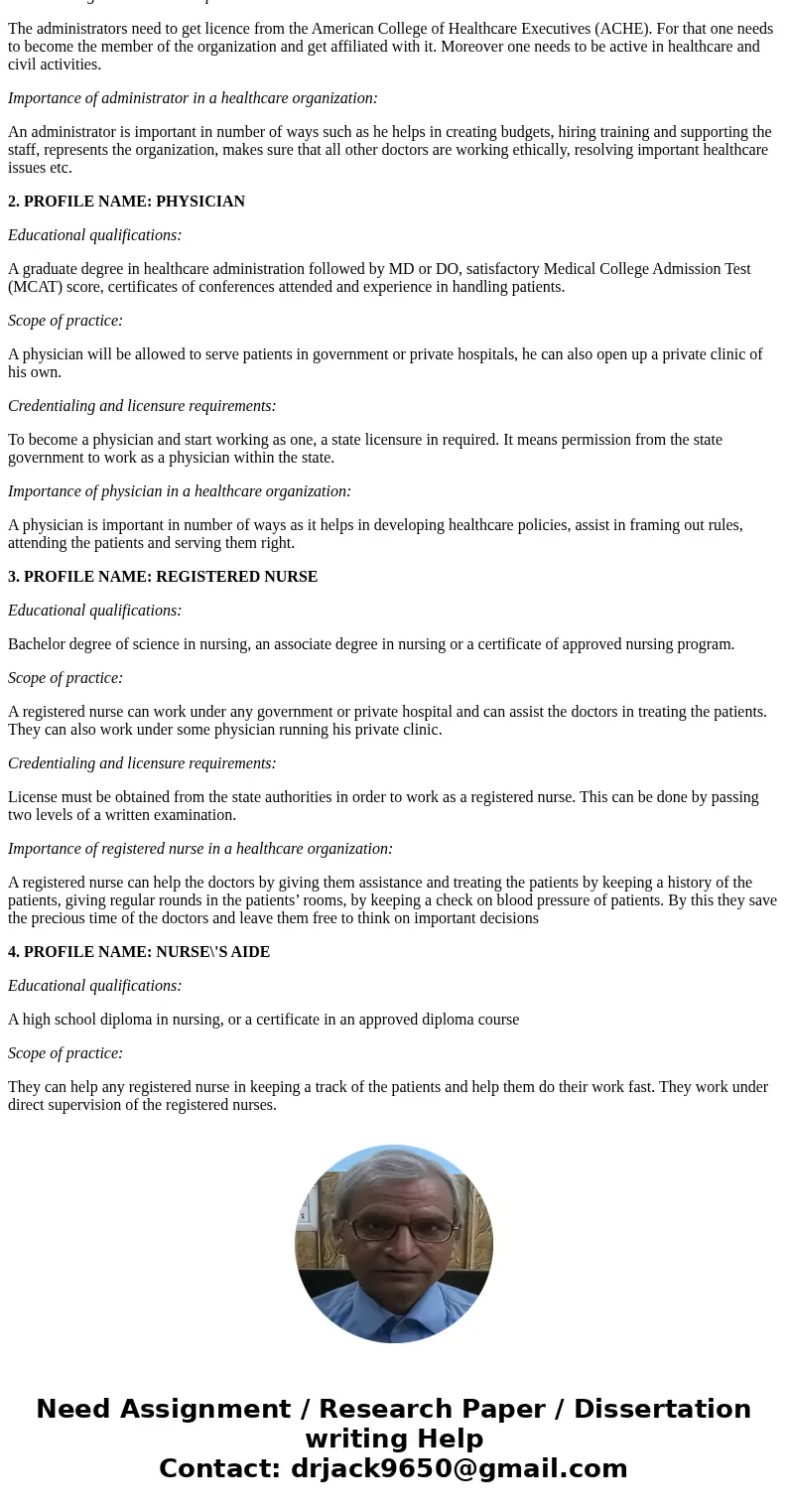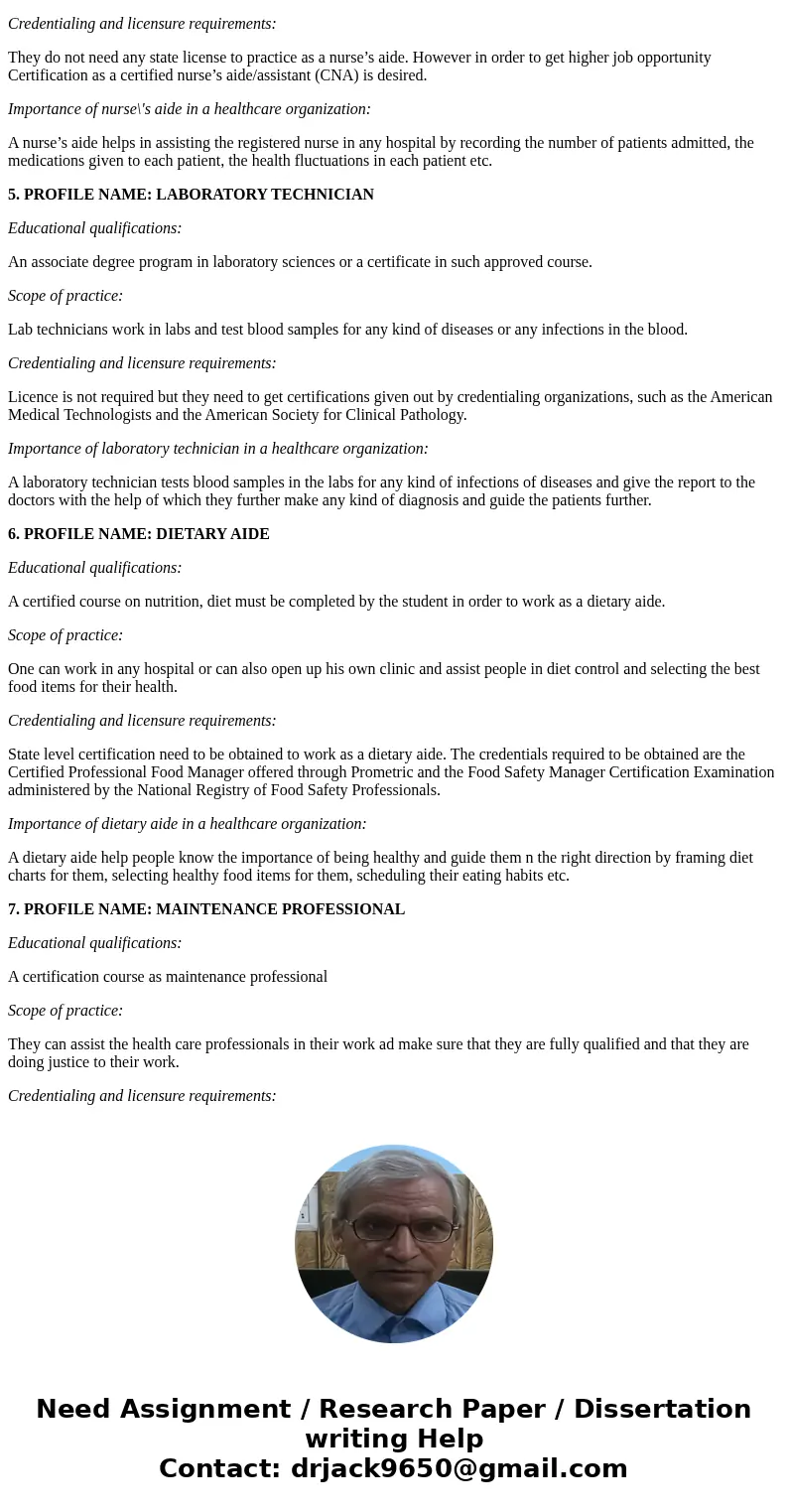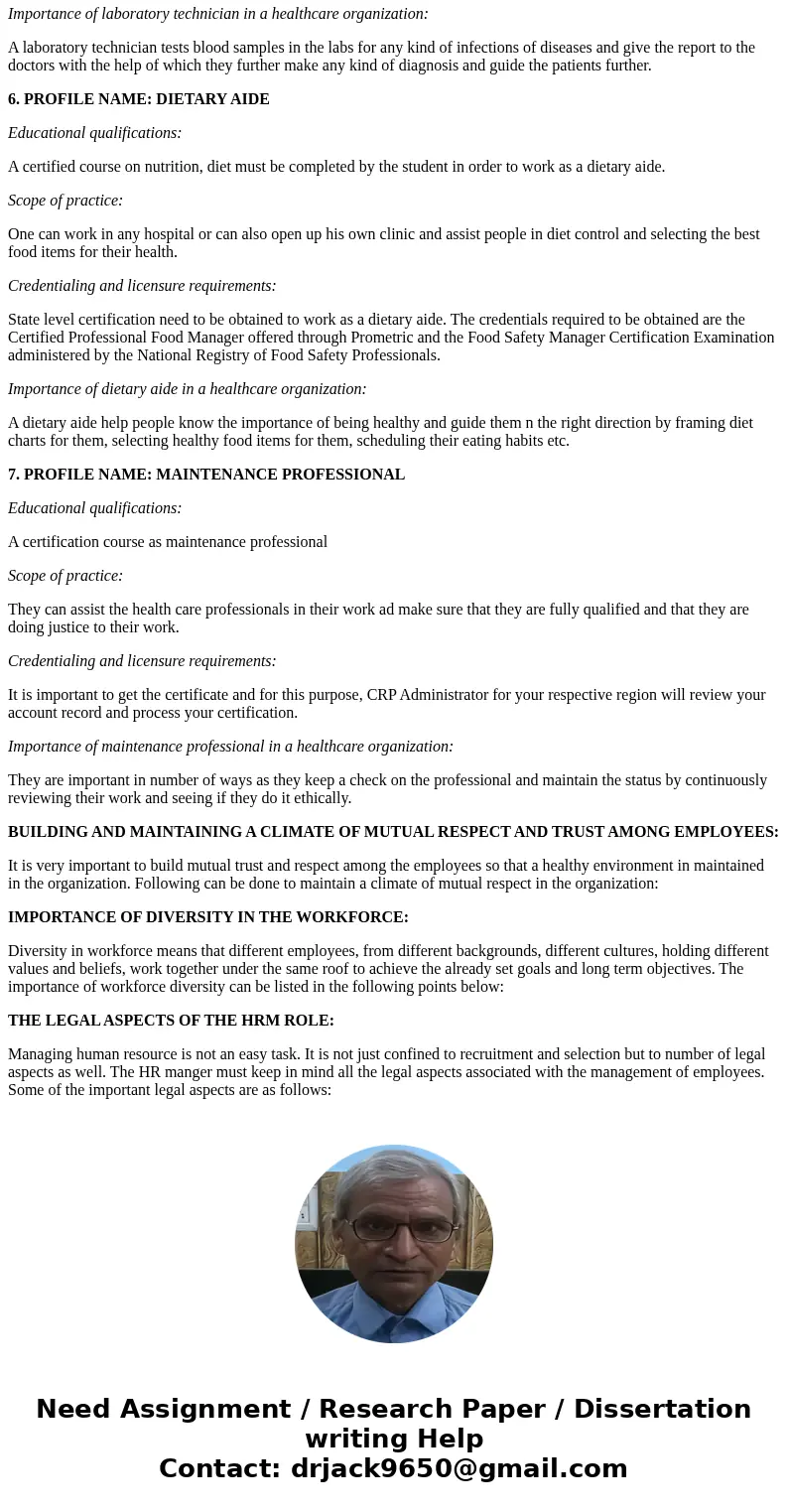WK3A2 Instructions You will explore the differences among ed
WK-3-A-2
Instructions
You will explore the differences among educational levels, the scopes of practice, and credentialing and licensure requirements for various employees in a healthcare organization.
Scenario: You are the HR manager of a newly established healthcare organization. The board of directors of the organization asks you to prepare a presentation on the required profiles for the following roles:
Administrator (i.e., chief executive officer, vice president of nursing or finance, etc.)
Physician
Registered nurse
Nurse\'s aide
Laboratory technician
Dietary aide
Maintenance professional
Tasks:
For each role, provide the following information:
Educational qualifications required for the role
Scope of practice for the role
Credentialing and licensure requirements for the role
A description of the importance of the role in a healthcare organization
Explain the legal aspects of the HRM role.
For the workforce as a whole, address the following:
How would you build and maintain a climate of mutual respect and trust among employees?
What is the importance of diversity in the workforce?
Submission Details:
Cite your sources in your work and provide references for the citations in APA format.
Your assignment should be addressed in a 16- to 20-PowerPoint presentation.
Solution
1. PROFILE NAME: ADMINISTRATOR
Educational qualifications:
A graduate (MBBS) degree in health administration, license to work as a doctor, experience of attending health related seminars and conferences.
Scope of practice:
Gain familiarity with Medicare & other laws, keep a track on the changes made in law and programs, maintain the level of knowledge in compliance with government regulations.
Credentialing and licensure requirements:
The administrators need to get licence from the American College of Healthcare Executives (ACHE). For that one needs to become the member of the organization and get affiliated with it. Moreover one needs to be active in healthcare and civil activities.
Importance of administrator in a healthcare organization:
An administrator is important in number of ways such as he helps in creating budgets, hiring training and supporting the staff, represents the organization, makes sure that all other doctors are working ethically, resolving important healthcare issues etc.
2. PROFILE NAME: PHYSICIAN
Educational qualifications:
A graduate degree in healthcare administration followed by MD or DO, satisfactory Medical College Admission Test (MCAT) score, certificates of conferences attended and experience in handling patients.
Scope of practice:
A physician will be allowed to serve patients in government or private hospitals, he can also open up a private clinic of his own.
Credentialing and licensure requirements:
To become a physician and start working as one, a state licensure in required. It means permission from the state government to work as a physician within the state.
Importance of physician in a healthcare organization:
A physician is important in number of ways as it helps in developing healthcare policies, assist in framing out rules, attending the patients and serving them right.
3. PROFILE NAME: REGISTERED NURSE
Educational qualifications:
Bachelor degree of science in nursing, an associate degree in nursing or a certificate of approved nursing program.
Scope of practice:
A registered nurse can work under any government or private hospital and can assist the doctors in treating the patients. They can also work under some physician running his private clinic.
Credentialing and licensure requirements:
License must be obtained from the state authorities in order to work as a registered nurse. This can be done by passing two levels of a written examination.
Importance of registered nurse in a healthcare organization:
A registered nurse can help the doctors by giving them assistance and treating the patients by keeping a history of the patients, giving regular rounds in the patients’ rooms, by keeping a check on blood pressure of patients. By this they save the precious time of the doctors and leave them free to think on important decisions
4. PROFILE NAME: NURSE\'S AIDE
Educational qualifications:
A high school diploma in nursing, or a certificate in an approved diploma course
Scope of practice:
They can help any registered nurse in keeping a track of the patients and help them do their work fast. They work under direct supervision of the registered nurses.
Credentialing and licensure requirements:
They do not need any state license to practice as a nurse’s aide. However in order to get higher job opportunity Certification as a certified nurse’s aide/assistant (CNA) is desired.
Importance of nurse\'s aide in a healthcare organization:
A nurse’s aide helps in assisting the registered nurse in any hospital by recording the number of patients admitted, the medications given to each patient, the health fluctuations in each patient etc.
5. PROFILE NAME: LABORATORY TECHNICIAN
Educational qualifications:
An associate degree program in laboratory sciences or a certificate in such approved course.
Scope of practice:
Lab technicians work in labs and test blood samples for any kind of diseases or any infections in the blood.
Credentialing and licensure requirements:
Licence is not required but they need to get certifications given out by credentialing organizations, such as the American Medical Technologists and the American Society for Clinical Pathology.
Importance of laboratory technician in a healthcare organization:
A laboratory technician tests blood samples in the labs for any kind of infections of diseases and give the report to the doctors with the help of which they further make any kind of diagnosis and guide the patients further.
6. PROFILE NAME: DIETARY AIDE
Educational qualifications:
A certified course on nutrition, diet must be completed by the student in order to work as a dietary aide.
Scope of practice:
One can work in any hospital or can also open up his own clinic and assist people in diet control and selecting the best food items for their health.
Credentialing and licensure requirements:
State level certification need to be obtained to work as a dietary aide. The credentials required to be obtained are the Certified Professional Food Manager offered through Prometric and the Food Safety Manager Certification Examination administered by the National Registry of Food Safety Professionals.
Importance of dietary aide in a healthcare organization:
A dietary aide help people know the importance of being healthy and guide them n the right direction by framing diet charts for them, selecting healthy food items for them, scheduling their eating habits etc.
7. PROFILE NAME: MAINTENANCE PROFESSIONAL
Educational qualifications:
A certification course as maintenance professional
Scope of practice:
They can assist the health care professionals in their work ad make sure that they are fully qualified and that they are doing justice to their work.
Credentialing and licensure requirements:
It is important to get the certificate and for this purpose, CRP Administrator for your respective region will review your account record and process your certification.
Importance of maintenance professional in a healthcare organization:
They are important in number of ways as they keep a check on the professional and maintain the status by continuously reviewing their work and seeing if they do it ethically.
BUILDING AND MAINTAINING A CLIMATE OF MUTUAL RESPECT AND TRUST AMONG EMPLOYEES:
It is very important to build mutual trust and respect among the employees so that a healthy environment in maintained in the organization. Following can be done to maintain a climate of mutual respect in the organization:
IMPORTANCE OF DIVERSITY IN THE WORKFORCE:
Diversity in workforce means that different employees, from different backgrounds, different cultures, holding different values and beliefs, work together under the same roof to achieve the already set goals and long term objectives. The importance of workforce diversity can be listed in the following points below:
THE LEGAL ASPECTS OF THE HRM ROLE:
Managing human resource is not an easy task. It is not just confined to recruitment and selection but to number of legal aspects as well. The HR manger must keep in mind all the legal aspects associated with the management of employees. Some of the important legal aspects are as follows:




 Homework Sourse
Homework Sourse